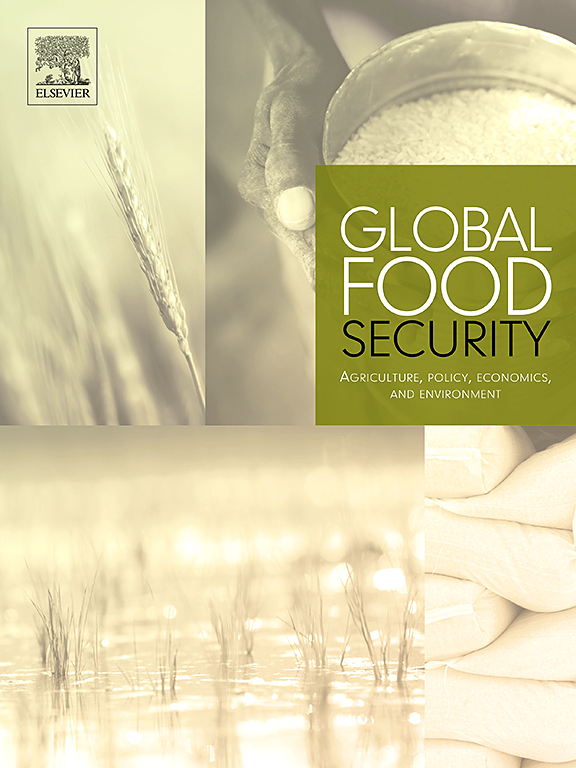Water-cropland resources and agricultural management shape the main interactions with food self-sufficiency goals
IF 9.6
1区 经济学
Q1 FOOD SCIENCE & TECHNOLOGY
Global Food Security-Agriculture Policy Economics and Environment
Pub Date : 2025-02-24
DOI:10.1016/j.gfs.2025.100841
引用次数: 0
Abstract
Regional and national food policies must seek to attain equilibrium among social, economic, political, agricultural, and environmental factors. As a developmental objective, food self-sufficiency (FSS) responds to a region's need for increased autonomy and control over its own food supply. In this systematic review, we employed the Preferred Reporting Items for Systematic Reviews and Meta-Analyses (PRISMA) protocol to assess the state of the art, then, we explored 109 final selected studies, focusing on the main interactions associated to achieving FSS goals. We found that FSS objectives can be realised through context-dependent interactions with 47 identified factors. The main limitations associated with attaining FSS goals emerge from the confluence of trade-offs with water and agricultural land. The positive interplay between FSS and agricultural management highlights the synergies that result from adopting advanced sustainable technologies and practices and optimizing resource-use efficiency, which holds promise for achieving FSS goals. We identified a shortage of studies focusing on food consumption, distribution, and access related factors, despite their relevance in promoting FSS and food security. We identified four primary developmental strategies rooted in local agricultural management practices, each aimed at addressing the achievement of FSS goals while mitigating associated trade-offs: cropland expansion/cropland-water resource management, yield gap closure, cropping systems diversification/integrated crop management, and urban agriculture. In conclusion, identifying factors that limit or strengthen FSS can help to facilitate the transition away from siloed government strategies to arbitrate between different holistic development strategies according to local contexts.
水田资源和农业管理构成了与粮食自给自足目标的主要相互作用
区域和国家粮食政策必须设法在社会、经济、政治、农业和环境因素之间取得平衡。作为一项发展目标,粮食自给自足(FSS)回应了一个地区对其自身粮食供应增加自主权和控制的需求。在本系统综述中,我们采用系统评价和荟萃分析首选报告项目(PRISMA)协议来评估最新的研究现状,然后,我们探索了109项最终选择的研究,重点关注与实现FSS目标相关的主要相互作用。我们发现,FSS目标可以通过与47个已确定因素的上下文相关的相互作用来实现。与实现FSS目标相关的主要限制来自与水和农业用地的权衡。FSS与农业管理之间的积极相互作用凸显了采用先进的可持续技术和实践以及优化资源利用效率所产生的协同效应,这为实现FSS目标带来了希望。我们发现缺乏关注食品消费、分配和获取相关因素的研究,尽管它们与促进FSS和粮食安全相关。我们确定了植根于当地农业管理实践的四项主要发展战略,每项战略都旨在实现FSS目标,同时减轻相关的权衡:农田扩张/农田-水资源管理、产量缺口闭合、种植系统多样化/作物综合管理和城市农业。总之,确定限制或加强FSS的因素有助于促进从孤立的政府战略过渡到根据当地情况在不同的整体发展战略之间进行仲裁。
本文章由计算机程序翻译,如有差异,请以英文原文为准。
求助全文
约1分钟内获得全文
求助全文
来源期刊

Global Food Security-Agriculture Policy Economics and Environment
FOOD SCIENCE & TECHNOLOGY-
CiteScore
20.90
自引率
3.40%
发文量
69
期刊介绍:
Global Food Security plays a vital role in addressing food security challenges from local to global levels. To secure food systems, it emphasizes multifaceted actions considering technological, biophysical, institutional, economic, social, and political factors. The goal is to foster food systems that meet nutritional needs, preserve the environment, support livelihoods, tackle climate change, and diminish inequalities. This journal serves as a platform for researchers, policymakers, and practitioners to access and engage with recent, diverse research and perspectives on achieving sustainable food security globally. It aspires to be an internationally recognized resource presenting cutting-edge insights in an accessible manner to a broad audience.
 求助内容:
求助内容: 应助结果提醒方式:
应助结果提醒方式:


